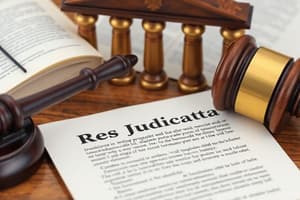Podcast
Questions and Answers
Under Section 9 of the Code of Civil Procedure (CPC), which scenario would typically be considered a suit of civil nature?
Under Section 9 of the Code of Civil Procedure (CPC), which scenario would typically be considered a suit of civil nature?
- A question strictly related to caste hierarchy and social standing.
- A case involving mismanagement of a religious institution's finances. (correct)
- A dispute solely concerning religious doctrines without any impact on property or office.
- A purely political question without any connection to civil rights.
In the context of Section 9 of the CPC, what is the significance of Explanation II, which was added in 1976?
In the context of Section 9 of the CPC, what is the significance of Explanation II, which was added in 1976?
- It affirms that suits related to religious office are maintainable even if no fees are attached to the said office. (correct)
- It clarifies that suits related to religious offices are not maintainable under any circumstances.
- It states that suits related to religious offices are maintainable only if substantial fees are attached to the office.
- It restricts religious offices from being a subject of civil suits.
According to the case laws discussed in relation to Section 9 CPC, under what circumstances can a civil court's jurisdiction be barred?
According to the case laws discussed in relation to Section 9 CPC, under what circumstances can a civil court's jurisdiction be barred?
- When the issue pertains to matters of public policy, regardless of any statutory provision.
- When a statute gives finality to a decision within that statute or when expressly or impliedly barred by law. (correct)
- Civil courts never lose jurisdiction, irrespective of any statutory provisions.
- Only when explicitly barred by law; implied bars are not recognized.
Which of the following scenarios would NOT typically be considered a 'Civil Nature' under Section 9 of the Code of Civil Procedure (CPC)?
Which of the following scenarios would NOT typically be considered a 'Civil Nature' under Section 9 of the Code of Civil Procedure (CPC)?
In the context of Section 10 CPC, concerning 'Stay of Suit,' what is the primary reason behind this legal provision?
In the context of Section 10 CPC, concerning 'Stay of Suit,' what is the primary reason behind this legal provision?
Which of the following conditions is NOT required for Section 10 of the CPC (Stay of Suit) to be applicable?
Which of the following conditions is NOT required for Section 10 of the CPC (Stay of Suit) to be applicable?
According to Radha Devi vs. Deep Narayan, what other Section should be read together with Section 10 to test its applicability?
According to Radha Devi vs. Deep Narayan, what other Section should be read together with Section 10 to test its applicability?
What legal principle forms the basis of Section 11 of the CPC, concerning 'Res Judicata'?
What legal principle forms the basis of Section 11 of the CPC, concerning 'Res Judicata'?
Under Section 11, what condition must be met for 'Res Judicata' to apply regarding a matter in a former suit?
Under Section 11, what condition must be met for 'Res Judicata' to apply regarding a matter in a former suit?
Which of the following best describes the implication of Explanation 4 to Section 11 CPC regarding constructive Res Judicata?
Which of the following best describes the implication of Explanation 4 to Section 11 CPC regarding constructive Res Judicata?
Flashcards
Section 9 CPC: Suits of Civil Nature
Section 9 CPC: Suits of Civil Nature
Empowers civil courts to try all suits unless explicitly or implicitly barred, covering disputes involving civil rights intertwined with social, religious, or political rights.
Explanation II of Section 9
Explanation II of Section 9
Even without attached fees, a suit related to a religious office is still maintainable.
Section 10 CPC: Stay of Suit (Res Sub Judice)
Section 10 CPC: Stay of Suit (Res Sub Judice)
Mandates the stay of a subsequently filed suit if a previous suit involving the same matter, parties, and jurisdiction is already in progress.
Explanation 5 of Section 11
Explanation 5 of Section 11
Signup and view all the flashcards
Section 11 CPC: Res Judicata
Section 11 CPC: Res Judicata
Signup and view all the flashcards
Study Notes
- The lecture discusses the Code of Civil Procedure (CPC) focusing on sections relevant for preliminary exams.
- The lecture emphasizes a case-law based approach to understanding CPC sections, alongside content review.
- The lecturer announces an upcoming price hike on Unacademy subscriptions and encourages interested individuals to subscribe.
- The lecturer highlights a judiciary scholarship test scheduled for February 16th at 11 AM.
Section 9 CPC: Suits of Civil Nature
- Section 9 is described as a "grand door" allowing individuals to seek legal recourse for various grievances under different laws (Indian Contract Act, TPA, Partnership, Torts, etc.).
- Section 9 addresses "civil nature" suits, which encompass more than just civil disputes.
- Civil nature occurs when a civil right intertwines with social, religious, or political rights.
- Section 9 permits filing a suit if mismanagement occurs in a religious institution impacting financial management as it's considered of a civil nature.
- Section 9 provides jurisdiction to civil courts to try all suits unless barred.
- Civil nature includes cases involving the right to property and right to office.
- Any question related to caste, religion per se, is generally not a suit of civil nature.
Explanation II of Section 9
- Explanation II was added in 1976.
- A suit related to religious office is maintainable even if no fees are attached to the said office.
Case Laws on Section 9
- PMA Metropolitan vs. Moran Marthoma: Court cannot refuse to hear suits unless expressly or impliedly barred.
- Dula Bhai vs. State of MP: Reinforces the presumption that every court has jurisdiction until expressly or impliedly barred.
- South Delhi Municipal Corporation vs. Today Homes: Civil court loses jurisdiction when a statute gives finality to a decision within that statute.
- Express bar occurs when a law specifically prevents courts from hearing certain matters (e.g., income tax tribunal, election tribunal, motor accident claims).
- Implied bar occurs when a specific statute addresses an issue or based on public policy.
Additional Points on Section 9
- The lecturer provides a list of what constitutes a "Civil Nature", for example: Right to property, Right to drainage, Damages for civil wrong, Breach of Contact, Suit relating to worship, Suirt respecting temples, Right to burial
- Examples of what does not constitute a civil nature: Purely Cast related questions, Purely Religious Right & Political Question (when not mixed with civil issues like property rights)
Section 10 CPC: Stay of Suit
- Section 10 deals with "Stay of Suit" also known as "Res Sub Judice." The heading of Section 10 is "Stay of Suits", not "Res Sub Judice."
- Section 10's purpose is to prevent parallel simultaneous litigation.
- The text uses example of a case filed in Mumbai + Nagpur court, regarding the same property in dispute to illustate the key concepts.
- Section 10 allows one party to file a suit, but mandates that the Trial gets stayed pending outcome of related case.
Conditions for Section 10 Applicability
- Two suits must be present: one previously instituted (e.g., in Mumbai) and another subsequently filed (e.g., in Nagpur court).
- The matter in both cases must be directly and substantially the same.
- Both suits must involve the same parties.
- The previously instituted suit must be in a court with competent jurisdiction.
Additional facts for Section 10
- Section 10 does not apply if the prior case is in a foreign court.
- Pukhraj D. Jain vs. Gopal Krishna the purpose is to prevent the court from entering two concurrent decisions, thus, it calls for 1 court to stay proceedings in such situation.
- Section 10 is a mandatory provision and trial of the suit can get barred (not the instition for suite).
- Radha Devi vs. Deep Narayan points out that the test for Applicabitliy of Section 10 is Section 11, Res judicata (to be read togeher)
- The decree passed in contravention of section 10 isn't a nullity and cannot be disregarded at the stage of execution.
Section 11 CPC: Res Judicata
- Section 11 concerns "Res Judicata," based on the rule of conclusiveness. This means judgements get finality assigned to them.
- This Section includes: Res (dispute); Judicata (decision); i.e. decision has alredy been made so the matter can't be decided again.
- Under this section, society believes that parties need certain dispute litigations needs to end, as per "Interest Republic Ut Sit Finis Litium"
- Under this section you can't be vewryed twice for the same cause.
- Under this section the court believes that there is finality with past litigations
- Key conditions are: the 1st former competent court, the parties were represented & the issue matters should be deemed to be finished.
- Additional Conditions: the matter should also be heard & finally decided. Can't get dismissed.
- Sulochana Amma vs. Nayaranan Nayar pointed out this rule applies to all jurdicial rulings including those of quadi-jurdicial too.
- Nawab Hussain vs. STate of UP is for both rest judicata, consrtuctive res, and can be applied to write petitions
- Shiv Prasad vs. Ramanand prasad narayan says the case are directed by times of wisdom (1960 case Lord lawerence jenkiins) and applies across all times.
- Satyadhyan ghosal vs dutt said rest juduicta gies finatlity to a judicial decision.
- Dutches of kind stone says rest judgemet is a way for the judge, for judgeents to get estopped.
Section 11 Explanations
- Explanation 1: It mentions prior case gets to determine and resolve the outcomde
- Explanation 2: Court gets it's competency here
- Explanation 3: Former suit happens here
- Explanation 4: it focuses on conntritive res to deem it decided to a particualar instance
- Explanation 5 if relif don't get claimed then rest judicata might apply
- Explanation 6 representative suite rest judicata might apply
- Explanation 7 execution precedings may apply
- Explnation 8 limited jurisdications
Studying That Suits You
Use AI to generate personalized quizzes and flashcards to suit your learning preferences.




